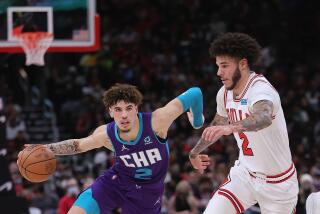Lab Owner in Drug Probe Forced Into the Spotlight
SAN FRANCISCO — Some of the most recognizable faces in the world of sports will file through a U.S. district courthouse here in coming weeks, subpoenaed to testify before a federal grand jury.
Barry Bonds, among the greatest home-run hitters in baseball, is scheduled to appear. So are Jason Giambi of the New York Yankees and sprinter Kelli White, who won two gold medals at the recent world track championships.
These athletes and dozens more will be questioned about a man who, despite his connection to such celebrities, has heretofore operated outside the public eye.
Victor Conte does business from a drab storefront south of San Francisco, in a Burlingame industrial park not far from the airport. Bay Area Laboratory Co-Operative, or BALCO, specializes in nutritional supplements that promise to boost athletic performance.
The federal government is reportedly investigating BALCO on suspicion of violating federal tax and money-laundering laws. The company also is at the center of what is being called the biggest steroid bust in U.S. and Olympic sports. It was cited by Olympic anti-doping officials as the source of a new performance-enhancing drug found in urine samples of an unspecified number of track and field athletes.
While Conte has remained in seclusion -- surfacing only to deny wrongdoing in e-mails to The Times and other media outlets -- a photograph shows him in a lab coat and glasses, with a receding hairline, standing beside a machine identified as an “inductively coupled plasma spectrometer.”
If this image suggests a nerdish scientist tinkering in the lab, interviews with friends, business associates and adversaries paint a different picture.
These people speak of a youngster who showed promise as a runner, then became an accomplished jazz bassist playing with such talents as Herbie Hancock and Tower of Power. Then he walked away from music in his prime and began marketing supplements with the zeal of a veteran salesman.
“That guy, he was too smart to do any one thing,” said Harvey Mandel, a guitarist who played with Conte in the 1970s and remains a friend. “You could see Victor being anything.”
But Conte was also a man who attracted a string of lawsuits and tax liens as he moved toward the maelstrom that now envelopes him.
It all seems so unlikely, looking back to the early 1970s when Conte played bass with Mandel in a band fronted by the late blues violinist Don “Sugarcane” Harris.
“Victor wasn’t just a three-chord, rock ‘n’ roll blues player,” Mandel said. “You could play any type of song, even jazz fusion, he’d be right there with you.”
The trio formed a band called -- ironically -- Pure Food and Drug Act. The manager coined that name as an inside joke referring to the fact that most of the members were teetotalers while Harris had a well-known drug habit.
To his fellow players, Conte became known as Walkin’ Fish because of the way he moved on stage. But when the band wanted to publish a song, he was the man who knew which numbers to call and which forms to submit.
“He always took care of the business end of things,” said Freddie Roulette, a lap-steel guitarist who played with Conte on other projects.
As the 1970s wore on, Conte moved up the music industry ladder, eventually playing with Hancock’s band. In 1978, he joined cousin Bruce Conte, a guitarist, in Tower of Power.
Not everything went smoothly, however. Former Tower of Power trumpet player Mic Gillette recalls that after the band recorded its “We Came to Play” album, Victor and Bruce Conte were asked to leave.
“He was conspiring with his cousin to take over the band and run it themselves,” Gillette said in an e-mail.
Bruce Conte could not be reached for comment.
In 1980, Victor Conte quit music to open the Millbrae Holistic Health Center. In a divorce document filed in December 2001, his former wife, Audrey, contends this business represented Conte’s first “exposure to the nutrition market.”
By the late 1980s, according to court papers, Conte had closed the Millbrae business to focus on BALCO and a sister company called Scientific Nutrition for Advanced Conditioning, or SNAC Systems Inc.
The couple refinanced their home, took out lines of credit and persuaded family and friends to invest in the ventures.
Though Conte had no formal background in science or medicine, he began testing blood samples for levels of trace minerals. He offered supplements to correct any deficiencies.
This service was marketed not only to athletes but also Medicare patients -- and that was where BALCO first ran into trouble.
During the mid-1990s, according to an ongoing civil case filed by the U.S. attorney in San Francisco, the company was involved in a scheme that allegedly paid physicians to order unnecessary trace mineral tests for their patients.
While Conte was not mentioned by name in the complaint, the government sought to have BALCO reimburse more than $1 million that Medicare paid for those tests. Conte claimed the suit was groundless. The company did not file a response in court but has contacted federal attorneys to discuss a settlement.
The parties “continue exploring a possible resolution to the case,” according to a document filed in court last month.
During the mid- to late-1990s, BALCO and/or Conte were hit with at least 14 lawsuits alleging failure to pay debts or fulfill contracts. Meanwhile, federal, state and county governments placed at least 16 tax liens ranging from $80 to $34,013 on Conte or his company.
Of the people who spoke to The Times about their lawsuits against Conte, none said that he was a victim of business setbacks or hard times.
“The guy just didn’t pay his bills,” said Rick Flora of R. Flora and Associates, a Southern California firm hired to review labels on BALCO products.
During this time, however, Conte exuded confidence and began doing business with big-name athletes.
Track coach Remi Korchemny said he had never heard of BALCO and its supplements until one of his runners, Chryste Gaines, worked out with Bill Romanowski, an Oakland Raider linebacker who then played for the Denver Broncos.
“Bill had the supplements,” Korchemny said. “I asked if I could get this stuff and he gave me the phone number for the BALCO lab.”
Romanowski, who did not return calls from The Times, was apparently a big booster of Conte’s most popular product -- ZMA -- a zinc and magnesium concoction .
“I’ve got about 90% of the Broncos on ZMA,” he told Muscular Development magazine in January 2000. “The guys are telling me they sleep better and feel better. Victor’s the man.”
Asked about Romanowski’s relationship with Conte, a Bronco spokesman said: “If Bill Romanowski or any other players had involvement of their own, it was their personal business and not a team arrangement.”
The Miami Dolphins have also sought to distance themselves from BALCO.
“A number of years ago, [Conte] tested some of our players for mineral deficiencies and gave us a perfectly legal mineral supplement,” team Vice President Harvey Greene said. “That’s the only involvement we’ve had with them. I don’t remember whether or not he was even paid for that.”
The Web site of SNAC, however, boasts a “Who’s Who” of a client list, including three-time Olympic gold medalist Marion Jones, former NFL quarterbacks John Elway and Dan Marino, the entire 1992-94 roster of the Seattle Supersonics and tennis great Ivan Lendl.
Like several other athletes on the list, former Bronco safety Steve Atwater said through a team spokesman he did not know Conte or use his products.
In contrast, Bonds of the San Francisco Giants has a visible connection to Conte. In a June article in Muscle & Fitness magazine, he is pictured in clothing bearing the ZMA logo and praises the supplement.
“People don’t understand how important this is,” the slugger was quoted as saying. “I visit BALCO every three to six months. They check my blood to make sure my levels are where they should be.”
Bonds has been unavailable for comment.
No quick resolution is expected for Conte’s legal problems. The grand jury proceedings could stretch through this winter, and there is still no end to deliberations over the federal civil suit.
Sports officials are similarly vowing a strenuous probe of whether Conte was the source of the new chemical, tetrahydrogestrinone, or THG.
Former bandmate Mandel, who spoke to Conte recently, said his friend remains characteristically upbeat.
“This is just a hassle he’s going through,” Mandel said. “He said he’s not worried because he did not do anything wrong.”
*
Times staff writers Myron Levin and Sam Farmer also contributed to this report.
More to Read
Go beyond the scoreboard
Get the latest on L.A.'s teams in the daily Sports Report newsletter.
You may occasionally receive promotional content from the Los Angeles Times.











